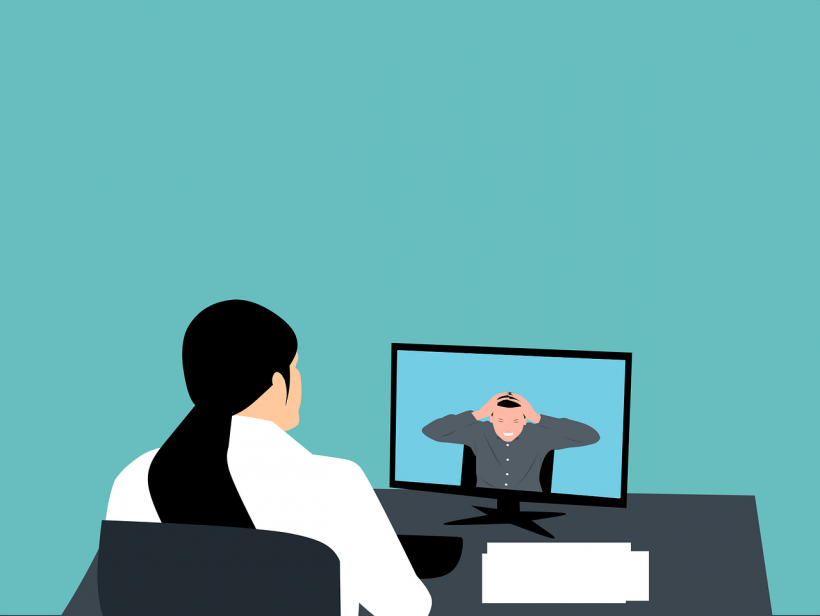Whether you call it online therapy, telepsychology or e-therapy, the fact is that virtual mental health treatments by messaging, email or webcam are not new concepts and have been around in some form or the other since the mid-1990s.
However, the increase in broadband services and the exponential rise of smartphone use came as a boon to app based healthcare companies, who utilized this opportunity to grow by providing additional benefits like accessibility, affordable pricing and quick therapy services to their clients.
Online therapy: Is it here to stay?
Once considered to be inferior to traditional face to face care, online therapy today has rapidly transformed into a convenient and safe substitute, for people seeking mental health care treatment from the comfort of their homes.
Events of the past few years have shown how within weeks the telehealth industry was able to absorb the challenges of wide-scale adoption, and once the change took off,there was no reason to fall back.
Since healthcare providers had no choice but to consult with their clients online, it was but obvious that online counseling services would only continue to grow in popularity, even after people are able to resume in-person visits with their therapists and doctors.
Another important reason that virtual therapy will extend well into the future of mental health practices is its ability to make mental health therapy much more affordable, and that too from a safe and secure environment. These days, the most affordable online therapy platforms charge as little as $25 per week for a therapy session.
While an average office session with a licensed therapist can cost up to $120 or even more depending on insurance and circumstances, a weekly online therapy session can cost $50 or even less if subscribed monthly or on a yearly basis.
The way we see it, with figures like this, people will love the pricing and ease of access of online counseling. We can't see it going anywhere in the foreseeable future, rather it will continue to grow in popularity and should be gratefully adapted and not resisted.
Lastly, with governments worldwide realizing the importance of digital technology, the chances of even mental health professionals embracing mHealth apps is even higher.
Importance of online counseling
There is a widespread shortage of mental health care providers in many parts of the world, including the US where people have access to care but it is inconvenient, limited and potentially embarrassing.The role of telehealth, therefore, has become critical for helping those who need it most.
For those who want to take the leap, but find starting therapy a bit daunting, switching to a session with a therapist through phone or video call, with your pet at your feet, may feel much more comfortable.
Or perhaps, you don't have enough time in the day to pick up the children from school and then scramble to meet your appointment with your doctor. In such cases online therapy is the only recourse. Many people with mental issues do not seek help, but with an app they have at least something to fall back on.
One must realize that availing online therapy for mental health treatment is in itself a healthy action for all. Even a short session of counseling can be of immense help to improve day to day life.
Care should be immediate
Mental illness accounts for a third of the world's disabilities owing to adult health problems, but our existing models of online mental treatment and available care fail to address these complex global challenges.
Where time is the criteria, mental app health platforms like Talkspace makes therapy easy by providing direct and immediate access to your chosen therapist.A good option for those who want to schedule an appointment at a mutually convenient time.
Another app like Sesame believes in providing high quality and affordable access to health care by connecting the patients directly and fast with the online specialists in order not only to get the best care, but at the right price as well in the guaranteed time.
Available in Washington DC, California, Maryland and Virginia, SameDay health is another upcoming app that provides fast and efficient care, eliminating the waiting times in waiting rooms and filling tedious forms. Moreover, a SameDay health doctor can prescribe medications and refills if it is deemed necessary.
Mental health apps for immediate help
Mental health apps may not be designed as a substitute for traditional care, but they do provide a simple way to support your overall mental health.
Twenty-Four Hours a Day(iOS& Android)
Based on the best selling book of the same name, Twenty-Four Hours a Day offers users more than 366 meditations to help people recover from addiction and focus on sobriety wherever they are.
Happify (iOS and Android)
An astonishing 86% of the app users have reported feeling better from depression after just two months of using the Happify app. The app works fast by employing techniques in the areas of CBT and mindfulness to break unhealthy habits to improve life by fighting negativity.
Are mental health apps to treat telebehavioral health helpful or harmful?
Mental health apps claim to treat anxiety, depression and other mental illnesses with no wait time involved and provide immediate access to every person with a smartphone. Additionally, apart from the convenience, many apps are free to download.
With the market for mental health apps expected to grow at a CAGR of 20.5% to exceed $3.3 billion by 2027 as per data provided by UnivDatos Market Insights in June 2021, venture capitalists and online developers are queuing up to make mobile phone based interventions for mental health.
The mental health industry may be skyrocketing, but clinicians and scientists are asking if these apps are effective and work remains to be seen.
When looking at the types of psychotherapy available, the strongest factor in symptom improvement and helping patients to make progress is the relationship with the therapist. Speaking eye to eye develops a trustworthy relationship, which is an essential component of therapy.
Sadly, a mobile app removes this human element which is a critical element of therapeutic success. That said, mobile apps can complement therapy through reminders and system trackers to share progress.
Again, though mobile apps are data-driven, they cannot take the place of a trained physician, at least for the time being. If someone is suffering from severe symptoms, more often than not you will require more than a mobile app to provide the right diagnosis.
For emergency help
People mostly are not able to get mental health treatment because they don't know where to start.
If the situation is life-threatening, get immediate emergency assistance by calling the 911(available 24x7) hotline.
If you, or someone you know is in emotional distress or is suicidal contact the 988 Suicide and Crisis Lifeline (toll free) where trained workers are available round the clock for providing crisis counseling and mental health referrals.
Alternatively, one can seek treatment in the United States and its union territories through SAMHSA, a Behavioral Health Treatment Services Locator in a confidential and anonymous manner.
* This is a contributed article and this content does not necessarily represent the views of sciencetimes.com




![Humans Will Go Extinct on Earth in 250 Million Years; Mass Extinction Will Occur Sooner if Burning Fossil Fuels Continues [Study]](https://1721181113.rsc.cdn77.org/data/thumbs/full/53373/89/56/50/40/humans-will-go-extinct-on-earth-in-250-million-years-mass-extinction-will-occur-sooner-if-burning-fossil-fuels-continues-study.jpeg)










